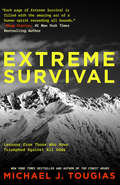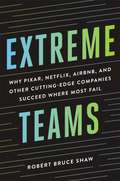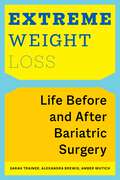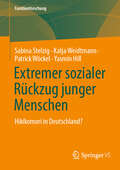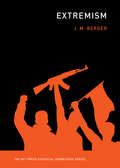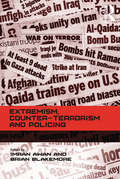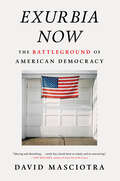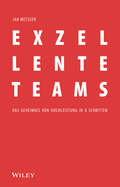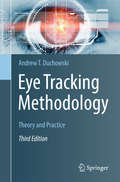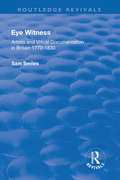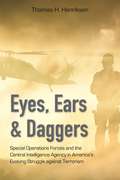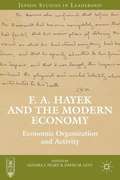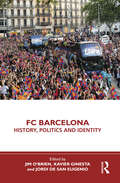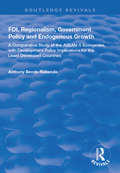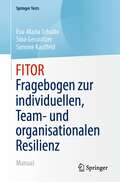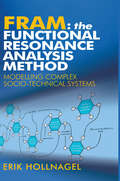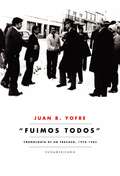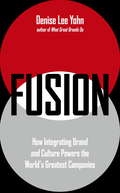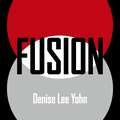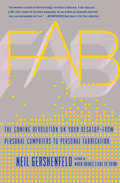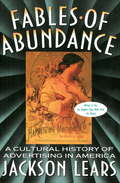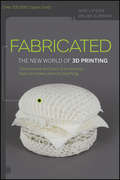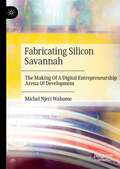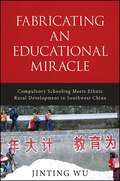- Table View
- List View
Extreme Survival: Lessons from Those Who Have Triumphed Against All Odds
by Michael J TogiasWitness True Resilience in These Incredible Survival Stories“Michael Tougias converts the wisdom of survivors into advice we can all use...” —Amanda Ripley, bestselling author of The Unthinkable: Who Survives When Disaster Strikes—and Why#1 New Release in Disaster ReliefExtreme Survival will have you on the edge-of-your-seat with truly amazing survival stories.New York Times bestselling author Michael Tougias has earned critical acclaim and literary awards for his many best-seller non-fiction narratives. Extreme Survival is the long-awaited follow-up to The Finest Hours, co-authored with Casey Sherman.Explore the stories and the causes of manmade disasters. To answer the question of why disasters happen and how some survive, Tougias interviewed over 100 people who survived against all odds, first chronicling their harrowing survival stories, and then discussing in detail lessons learned. Extreme Survival delivers the entertainment and exceptional research Michael Tougias fans expect.Understand resilience through the mindset of survivors. Surviving disasters requires survival techniques to kick in at the right moment. Learn what a person is capable of when under extreme pressure and facing imminent disaster.Inside find:Captivating and narrative survival stories told in true Tougias trademark styleAnalysis of major man-made disasters and the faulty decisions that led to themFirst-person accounts and detailed survival tactics that can apply to your every-day lifeIf you like true survival books like The Greatest Survival Stories of All Time, Into Thin Air, The Gift of Fear, Into the Abyss, Deep Survival, or If I Live Until Morning, you’ll love Extreme Survival. Also don’t miss reading other Michael Tougais survival books, including Fatal Forecast, Ten Hours Until Dawn, A Storm Too Soon, and Overboard!
Extreme Teams: Why Pixar, Netflix, Airbnb, and Other Cutting-Edge Companies Succeed Where Most Fail
by Robert Bruce ShawThis book takes a revitalized look at how teams should work in today&’s business is driving real growth in some of the world&’s most innovative firms.Every manager desires to have great teams around them collaborating together and running with the mission. Unfortunately, most of these teams have been built around outdated practices made popular by companies that either no longer exist or haven&’t been relevant in years.However, a new generation of teams has learned to do things differently--things like hiring the right person instead of the best person; focusing on one priority while leaving room to explore new ideas; creating an environment where people are comfortable dealing with the uncomfortable; and maximizing profit by not making it top priority.In Extreme Teams, take a peek into top companies and examine the teamwork experiments powering their results, including how:Pixar&’s teams use constant feedback and debate to transform initially flawed films into billion-dollar hitsA culture of radical &“freedom and responsibility&” helps Netflix execute on the next big thingWhole Food&’s super-autonomous teams embrace hard metrics and friendly competition to drive performanceZappos fuels the weirdness and fun that sustains its successFrom marketing to design to technology to product demand, everything has changed in business and will continue to do so. Why shouldn&’t the teams carrying out these changes undergo their own upgrades?
Extreme Weight Loss: Life Before and After Bariatric Surgery
by Sarah Trainer Alexandra Brewis Amber WutichA study that explores patients’ perspectives on a life-altering surgeryBariatric surgery rates around the world have increased exponentially over the past decade. In Extreme Weight Loss, anthropologists Sarah Trainer, Alexandra Brewis, and Amber Wutich provide us with an inside look at how patients experience this medical procedure, as well as its far-reaching and complex personal implications. Drawing on patient interviews, survey data, and more, Trainer, Brewis, and Wutich explore why people decide to undergo bariatric surgery, and how that decision transforms their lives. They show, in painstaking detail, how the journey to weight loss is can be at once painful and liberating, dispiriting and self-affirming.Extreme Weight Loss explores questions about which bodies are treated as though they belong in modern societies, and which bodies are treated as unwanted. It considers how people challenge and manage these unfair standards, illuminating what it means to be large-bodied in America’s diet-obsessed culture.
Extremer sozialer Rückzug junger Menschen: Hikikomori in Deutschland? (Familienforschung)
by Katja Weidtmann Sabina Stelzig Patrick Wöckel Yasmin HillDer Band bietet einen systematischen Überblick über das Phänomen extremer sozialer Rückzüge junger Menschen, das in Japan unter dem Begriff „Hikikomori&“ bekannt ist. Dieser Begriff bezeichnet die langfristige Selbstisolation junger Menschen vor der Gesellschaft, ohne dass vorrangig eine psychische Erkrankung vorliegt. Die Person im sozialen Rückzug wird zumeist - allerdings ohne einen direkten Kontakt - durch ihre Familie versorgt. Das Buchprojekt nähert sich dem Thema umfassend aus einer interdisziplinären Sicht. Dabei geraten nicht nur das Individuum selbst, sondern das gesamte Familiensystem sowie die es umgebenden kulturellen und gesellschaftliche Bedingungen in den Blick. Vor dem Hintergrund einiger Fallbeispiele wird diskutiert, ob der Rückzug von jungen Menschen aus der Gesellschaft auch in Deutschland sinnvoll mit dem Phänomen „Hikikomori&“ beschrieben werden kann. Denn während in Japan seit den 1990 Jahren auch auf staatlicher Ebene vielfältige unterstützende Präventions- und Interventionsformen entwickelt wurden, fallen in Deutschland junge Menschen im extremen sozialen Rückzug und ihre Angehörigen bislang durch fast alle Raster.
Extremism (The MIT Press Essential Knowledge Series)
by J. M. BergerWhat extremism is, how extremist ideologies are constructed, and why extremism can escalate into violence. A rising tide of extremist movements threaten to destabilize civil societies around the globe. It has never been more important to understand extremism, yet the dictionary definition—a logical starting point in a search for understanding—tells us only that extremism is “the quality or state of being extreme.” In this volume in the MIT Press Essential Knowledge series, J. M. Berger offers a nuanced introduction to extremist movements, explaining what extremism is, how extremist ideologies are constructed, and why extremism can escalate into violence. Berger shows that although the ideological content of extremist movements varies widely, there are common structural elements. Berger, an expert on extremist movements and terrorism, explains that extremism arises from a perception of “us versus them,” intensified by the conviction that the success of “us” is inseparable from hostile acts against “them.” Extremism differs from ordinary unpleasantness—run-of-the-mill hatred and racism—by its sweeping rationalization of an insistence on violence. Berger illustrates his argument with case studies and examples from around the world and throughout history, from the destruction of Carthage by the Romans—often called “the first genocide”—to the apocalyptic jihadism of Al Qaeda, America's new “alt-right,” and the anti-Semitic conspiracy tract The Protocols of the Elders of Zion. He describes the evolution of identity movements, individual and group radicalization, and more. If we understand the causes of extremism, and the common elements of extremist movements, Berger says, we will be more effective in countering it.
Extremism and the Psychology of Uncertainty (Blackwell/Claremont Applied Social Psychology Series #8)
by Danielle L. Blaylock Michael A. HoggExtremism and the Psychology of Uncertainty showcases cutting-edge scientific research on the extent to which uncertainty may lead to extremism. Contributions come from leading international scholars who focus on a wide variety of forms, facets and manifestations of extremist behavior. Systematically integrates and explores the growing diversity of social psychological perspectives on the uncertainty extremism relationship Showcases contemporary cutting edge scientific research from leading international scholars Offers a broad perspective on extremism and focuses on a wide variety of different forms, facets and manifestations Accessible to social and behavioral scientists, policy makers and those with a genuine interest in understanding the psychology of extremism
Extremism, Counter-terrorism and Policing
by Brian BlakemoreExtremism, Counter-terrorism and Policing brings together a diverse range of multidisciplinary studies to explore the extent of extremism and how communities are policed. Through analysing the historical development, the present situation, and future trends in the forms and ability to police violent extremism and terrorism, this text provides a detailed contribution towards both academic and policy debate surrounding extremism, its causes, and treatments. With chapters written by experts in their fields, this book provides the reader with detailed definitions of extremism; the psychology of extremists and the causes of radicalisation; policing extremism within a counter-terrorism context; community policing approaches to combating extremism; the legal frameworks and legislation regarding extremism and its limitations in an international setting; and public perceptions and understanding of extremism. It is crucial for policing professionals, policy-makers and academics to have a detailed understanding of government policy and the methods towards tackling extremism from a policing and community level. Extremism, Counter-terrorism and Policing gives a policing rationale alongside specific community approaches towards tackling extremist threats and provides key details for policy readers as well as academics.
Exurbia Now: The Battleground of American Democracy
by David MasciotraThe suburbs have become too liberal and diverse for many white American conservatives, so &“exurbia&”—areas outside the cities and their suburbs—are becoming the staging ground for the radical right extremist insurgency . . .Beyond a fanatical devotion to former president Donald Trump, one of the curious things that united the rank and file of the January 6 insurrectionist mob was that many of them were residents of one of America&’s fastest growing residential areas: Exurbia.Home to the likes of Georgia&’s Marjorie Taylor Greene, Ohio&’s Jim Jordan, big box retailers, chain restaurants, monster trucks, and megachurches, exurbia is becoming America&’s greatest political battleground, more important to American politics than urban or rural America. In this brilliant work of political and cultural inquiry, veteran political journalist David Masciotra provides a definitive account of what exurbia is, how it came to be, and how it's transforming American life. Zooming in outside the greater metropolitan area of Chicago—where Masciotra grew up—he shows how exurbia has become a safe space to fly the MAGA flag and romanticize the mores of the pre-civil rights, pre-feminist, pre-gay rights 1950s.But, as Masciotra also shows, reactionary white flight is not the whole story of small-town America. The story often lost is the power and persistence of small-town liberals—people who believe in equality, celebrate diversity, and enroll in movements for justice. Exurbia, as it turns out, is ground zero for the fight over a democracy mightily beleaguered, yet still full of promise, and still worth fighting for. Combining interviews, research, and anecdote—and anchored in personal experience—Exurbia Now delivers a powerful ballad on the state of small-town America, and provides a sense of the fight for democracy, on the ground, in the heartland.
Exzellente Teams: Das Geheimnis von Hochleistung in 8 Schritten
by Jan MetzgerJeder von uns kennt exzellente Teams: Wir gehen mit Vorfreude und Leichtigkeit zur Arbeit. Wir bringen Motivation und Ideen mit. Es gibt dort eine fröhliche, offene und robuste Kommunikation - und die Bereitschaft, jederzeit freundschaftlich zu streiten, wenn es dem besseren Ergebnis dient. Gute Leistung entsteht so fast von allein. Das macht die Magie großartiger Teams aus. Wie baut man ein exzellentes Team auf? Exzellenz und Hochleistung sind kein Geheimnis - wenn Führungskräfte und Teams das Wissen und das Können haben: Wissen: Wie verhalten sich Menschen in Organisationen? Neurobiologie und Sozialwissenschaften haben mittlerweile gut erforscht, welche Muster menschlichen Verhaltens in Teams und Organisationen immer wiederkehren. Zu verstehen, wie wir in der Gruppe ticken, ist die Grundlage für eine erfolgreiche Zusammenarbeit. "Exzellente Teams - Das Geheimnis von Hochleistung in 8 Schritten" fasst kompakt zusammen, was wir heute über die Funktionsweise herausragender Teams wissen. Können: Weil sie an die wiederkehrenden Verhaltensweisen und Bedürfnisse von Menschen in Teams anknüpfen, funktionieren die "8 Magic Skills", die dieses Buch empfiehlt, so zuverlässig. Mit ihrer Hilfe kann jedes Team Schritt für Schritt Sicherheit, Verlässlichkeit und Vertrauen aufbauen - und damit eine Kultur der Exzellenz. Meisterschaft: In Zeiten rascher und unberechenbarer Veränderungen sind selbsttragende und bewegliche Teams der Schlüssel zum Erfolg. Zur Meisterschaft gelangen herausragende Teams, indem sie sicher miteinander navigieren: Ihr Wegweiser sind der Sinn und die Bedeutung, die sie ihrer Arbeit geben. Auf ihrer gemeinsamen Reise durch Ungewissheit und Veränderung lernen sie ständig dazu. Das macht sie reaktionsbereit, leistungsfähig - und am Ende exzellent. Wissen, Können, Meisterschaft: Jedes Team und jede Führungskraft kann eine Gruppen-Kultur aufbauen, die Exzellenz und Hochleistung ermöglicht. "Exzellente Teams - Das Geheimnis von Hochleistung in 8 Schritten" zeigt, wie ein Team heranwächst, das sich wie ein intelligenter Schwarm bewegt und Leistungen erbringt, die alle Beteiligten glücklich machen.
Eye Tracking Methodology
by Andrew T. DuchowskiDespite the availability of cheap, fast, accurate and usable eye trackers, there is little information available on how to develop, implement and use these systems. This book aims to fill that gap in the market by providing an accessible introduction for practitioners and students. The first part of the book covers useful background information, including an introduction to the human visual system and key issues in visual perception and eye movement. The second part surveys eye-tracking devices and gives a detailed introduction to the technical requirements for installing a system and developing an application program. It focuses on video-based, corneal-reflection eye trackers - the most widely available and affordable type of system. The final part looks at a number of interesting and challenging applications in areas such as Human Factors, Collaborative Systems, Virtual Reality, Marketing and Advertising. Eye Tracking Methodology: Theory and Practice will be an invaluable guide for practitioners responsible for developing or implementing an eye tracking system. It will also be an invaluable teaching text for relevant modules on advanced undergraduate and postgraduate courses such
Eye Witness (Routledge Revivals)
by Sam SmilesThis title was first published in 2000: This study examines the ways in which very different visual fields might be said to have shared certain working assumptions concerning the truth of representation. It concentrates particularly on prints.
Eyes, Ears & Daggers: Special Operations Forces and the Central Intelligence Agency in America's Evolving Struggle against Terrorism
by Thomas H. HenriksenThomas H. Henriksen examines the warrior-spy connection both before and after the formation of the SOF and the CIA. Henriksen shows how, by adopting an intelligence-driven, targeted counter strike weapon against terrorists, the United States went from a Cold War Goliath to a more nimble force, thanks largely to the SOF and CIA contributions.
F. A. Hayek And The Modern Economy
by Sandra J. Peart David M. LevyWhat is the role of human agency in Friedrich Hayek's thought? This volume situates Hayek's writing as it relates to economic organization and activity, particularly to assess what role Hayek assigns to leaders in determining economic progress.
FC Barcelona: History, Politics and Identity
by Jim O’Brien Xavier Ginesta de San Eugenio, JordiThis is the first critical, in-depth academic study of FC Barcelona (also known as Barça), one of the world’s great football clubs, exploring the historical, political, cultural and commercial dimensions of this global sporting institution.The book examines why and how the club grew from its genesis as a small sporting organisation in the developing urban landscape of Barcelona in 1899 to become a contemporary giant that has both shaped and transcended football. It considers how globalisation, cultural identity and political ideology can help us to understand the development of Barça, but also how the growth of the phenomenon of FC Barcelona helps us to better understand those forces shaping contemporary global societies. It brings together leading scholars from around the world to examine key themes such as governance, regional and national politics, storytelling, fandom, digital media, branding, commercialisation and sport diplomacy, exploring topics such as the European Super League fiasco and the rise of Lionel Messi as a global icon. It also includes a series of chapters looking at the importance of FC Barcelona around the world, including in Latin America, the United States, Africa and East Asia.This illuminating, multi-disciplinary study of FC Barcelona is essential reading for anybody with an interest in football, Catalonian politics and culture, or the history, politics, culture and business of sport.
FDI, Regionalism, Government Policy and Endogenous Growth: A Comparative Study of the ASEAN-5 Economies, with Development Policy Implications for the Least Developed Countries
by Anthony Bende-NabendePublished in 1999, this text investigates whether FDI caused spill over effects which have led to the economic growth of the ASEAN-5 economies, and if that it so, whether the ASEAN Preferential Trade Agreement (APTA) had a significant effect in attracting FDI to the region. It takes into account the different levels of economic development of the countries under analysis. The results from the structural (static) model suggest that FDI has stimulated economic growth through the human factors followed by technology transfer, international trade, and learning by doing, and that the formation of APTA had a lagged influence on FDI inflows into the advantage of the more developed member countries and the disadvantage of the less developed countries. Those from the multiplier (dynamic) effects analysis demonstrate that whereas the impact is immediate in the more developed, politically stable and foreign investment friendly economies, there is a time lag in those economies which are less developed and more hostile to FDI. The analysis presents an empirical comparison of how the level of economic development affects the interaction of FDI, regionalism and economic growth.
FITOR - Fragebogen zur individuellen, Team und organisationalen Resilienz: Manual (SpringerTests)
by Simone Kauffeld Eva-Maria Schulte Sina GessnitzerFITOR (Fragebogen zur individuellen, Team und organisationalen Resilienz): Dieser Fragebogen erfasst die Resilienz – das Vermögen, Misserfolge, Rückschläge oder andere potentiell bedrohliche Situationen erfolgreich zu überwinden – auf Ebene des Individuums-, des Teams- und der Organisation. Autoren: Dr. Eva-Maria Schulte, Dr. Sina Gessnitzer, Prof. Dr. Simone Kauffeld Die internen Konsistenzen der reduzierten Skala lagen sowohl für die individuelle Ebene (Studie 1: α = 0,84; Studie 2: α = 0,82), als auch für die Team- (Studie 1: α = 0,93; Studie 2: α = 0,94.) und die organisationale Ebene (Studie 1: α = 0,92; Studie 2: α = 0,92) im guten bis sehr guten Bereich (Kline 1999). Konvergente Validierung anhand unterschiedlicher Skalen je Ebene z.B. Validierungsskalen der individuellen Ebene: Individuelle Selbstwirksamkeit Validierungsskalen der Teamebene: Selbstwirksamkeit im Team Validierungsskalen der organisationalen Ebene: Organisationsklima Da der FITOR auf drei Ebenen (Individuum, Team, Unternehmen) ausgewertet werden kann, müssen wir uns hier mit den Autorinnen kurzschließen, aber die sind ja in direkter Nähe… ich würde es als Gruppenverfahren ähnlich wie den SPA sehen: Mindestanzahl Teilnehmende bevor ich Ergebnisse sehen kann. Die Individual- und Teamitems könnten als Mittelwerte pro Team ausgewertet werden. Um ein sinnvolles Ergebnis für ein ganzes Unternehmen zu bekommen, könnte eine Funktion zum Aggregieren mehrerer Gruppenergebnisse implementiert werden. Allerdings ist hier auch die Frage, ob ich die Unternehmensitems auch aus Sicht des Teams als Mittelwert nutzen kann – „Was denkt das Team über die Unternehmens-Reslizienz“? Wenn das möglich ist, wäre es vermutlich ein „reines“ Standardverfahren analog zum SPA. Weitere Möglichkeiten ohne eine konkrete technische Umsetzung im Kopf zu haben: Die Teilnehmenden bekommen nach dem Ausfüllen einen Individual-Report als PDF zugeschickt (bzw. angezeigt, wenn sie keine Mail Adresse haben). So hätten wir auch eine individuelle Auswertung, ohne dass eine Führungskraft Einzelergebnisse sieht.
FRAM: Modelling Complex Socio-technical Systems
by Erik HollnagelResilience engineering has consistently argued that safety is more than the absence of failures. Since the first book was published in 2006, several book chapters and papers have demonstrated the advantage in going behind 'human error' and beyond the failure concept, just as a number of serious accidents have accentuated the need for it. But there has not yet been a comprehensive method for doing so; the Functional Resonance Analysis Method (FRAM) fulfils that need. Whereas commonly used methods explain events by interpreting them in terms of an already existing model, the FRAM is used to model the functions that are needed for everyday performance to succeed. This model can then be used to explain specific events, by showing how functions can be coupled and how the variability of everyday performance sometimes may lead to unexpected and out-of-scale outcomes - either good or bad. The FRAM is based on four principles: equivalence of failures and successes, approximate adjustments, emergence, and functional resonance. As the FRAM is a method rather than a model, it makes no assumptions about how the system under investigation is structured or organised, nor about possible causes and cause-effect relations. Instead of looking for failures and malfunctions, the FRAM explains outcomes in terms of how functions become coupled and how everyday performance variability may resonate. This book presents a detailed and tested method that can be used to model how complex and dynamic socio-technical systems work, to understand why things sometimes go wrong but also why they normally succeed.
FUIMOS TODOS (EBOOK)
by Juan B. Yofre"Nadie fue", el libro anterior de Juan B. Yofre, se convirtió en una de las grandes sorpresas editoriales de los últimos años. Sobre la base de fuentes privilegiadas, narraba el desarrollo histórico de la Argentina de los años 70 hasta la caída de Isabel Perón. Fuimos todos es la fascinante continuación de aquel éxito: retoma los avatares de nuestra historia desde el 24 de marzo de 1976 hasta la aventura militar de Malvinas -que llevó al fin del Proceso- y sus consecuencias. Yofre repite aquí su procedimiento periodístico, exhuma documentos, apuntes, informes, cartas, que ven la luz por primera vez. Hallazgos que muestran aspectos absolutamente desconocidos de un período de violencia y dan cuenta del enfrentamiento entre los argentinos, ya no solamente de las Fuerzas Armadas y las organizaciones terroristas sino también de las continuas luchas intestinas del propio régimen castrense. Un eslabón más en la historia de la decadencia política argentina. Exhaustivamente documentado, polémico, revelador, Fuimos todos expone los hechos, como dice el autor, "sine ira et cum studio", es decir, para que el lector saque sus propias conclusiones y con la honesta intención de evitar que se repitan los nefastos errores del pasado reciente. El teniente general Jorge Rafael Videla asumió la presidencia de la Nación el 29 de marzo de 1976, luego de deponer cinco días antes a la presidenta constitucional María Estela Martínez Cartas de Perón, más conocida por su nombre artístico de "Isabel". Al poco tiempo, Videla comenzó a realizar visitas a ciudades del interior. La foto lo muestra durante un viaje a la austral ciudad de Ushuaia, Tierra del Fuego, en el invierno de 1976. Como evidencia la instantánea, a pesar del rigor climático la gente se acercaba a saludarlo. Es más, si se pone la atención se verá que un hombre salió de un lugar cerrado, sólo con un suéter, para estrechar su mano. Es una foto atípica que muestra en pequeña escala el grado de aquiescencia del que gozó el gobierno del Proceso militar en sus primeros años de gran parte de la ciudadanía. Dos años más tarde, Videla debería salir al balcón de la Casa de Gobierno para saludar a la multitud que festejaba la victoria del Campeonato Mundial de Fútbol de 1978. Y lo mismo ocurrió en septiembre de 1979, cuando la selección juvenil de fútbol se consagró campeona mundial en Japón. Esta foto fue elegida por lo escasamente conocida. Y porque exhibe a un Videla en el que no aparecen rodeándolo custodias ni agentes de seguridad. Sólo simples ciudadanos con interés en saludar a su presidente.
FUSION: How Integrating Brand and Culture Powers the World's Greatest Companies
by Denise Lee Yohn'Leaders everywhere are trying to build great brands, but few realise how powerfully brands are shaped by the cultures of their organizations. This compelling book shows how.' -Adam Grant, New York Times bestselling author of Originals and Give and TakeIn FUSION, Denise Lee Yohn examines some of the world's greatest organizations and reverse-engineers their greatness - specifically how they've integrated what's on the inside (culture) with what's on the outside (brand) for remarkable results. Through detailed case studies, interviews with industry leaders, findings from respected academic research and drawing on her own experience working with extraordinary brands across a broad range of sectors, Denise shows how great companies achieve the brand-culture fusion that creates extraordinary results and growth. FUSION is for those with responsibility and oversight for the core operations of their business (C-Suite and line managers) who also set the tone and direction for their companies. The book includes access to Denise's proprietary online assessment for determining how close to or how far from brand/culture integration a company is and a blueprint for achieving brand-culture fusion.
FUSION: How Integrating Brand and Culture Powers the World's Greatest Companies
by Denise Lee Yohn'Leaders everywhere are trying to build great brands, but few realise how powerfully brands are shaped by the cultures of their organizations. This compelling book shows how.' -Adam Grant, New York Times bestselling author of Originals and Give and TakeIn FUSION, Denise Lee Yohn examines some of the world's greatest organizations and reverse-engineers their greatness - specifically how they've integrated what's on the inside (culture) with what's on the outside (brand) for remarkable results. Through detailed case studies, interviews with industry leaders, findings from respected academic research and drawing on her own experience working with extraordinary brands across a broad range of sectors, Denise shows how great companies achieve the brand-culture fusion that creates extraordinary results and growth. FUSION is for those with responsibility and oversight for the core operations of their business (C-Suite and line managers) who also set the tone and direction for their companies. The book includes access to Denise's proprietary online assessment for determining how close to or how far from brand/culture integration a company is and a blueprint for achieving brand-culture fusion.(P)2018 Hodder & Stoughton Limited
Fab: The Coming Revolution on Your Desktop--from Personal Computers to Personal Fabrication
by Neil GershenfeldWhat if you could someday put the manufacturing power of an automobile plant on your desktop? According to Neil Gershenfeld, the renowned MIT scientist and inventor, the next big thing is personal fabrication-the ability to design and produce your own products, in your own home, with a machine that combines consumer electronics and industrial tools. Personal fabricators are about to revolutionize the world just as personal computers did a generation ago, and Fab shows us how.
Fables Of Abundance: A Cultural History Of Advertising In America
by Jackson LearsFables of Abundance ranges from the traveling peddlers of early modern Europe to the twentieth-century American corporation, exploring the ways that advertising collaborated with other cultural institutions to produce the dominant aspirations and anxieties in the modern United States.
Fabricated
by Hod Lipson Melba KurmanFabricated tells the story of 3D printers, humble manufacturing machines that are bursting out of the factory and into schools, kitchens, hospitals, even onto the fashion catwalk. Fabricated describes our emerging world of printable products, where people design and 3D print their own creations as easily as they edit an online document.A 3D printer transforms digital information into a physical object by carrying out instructions from an electronic design file, or 'blueprint.' Guided by a design file, a 3D printer lays down layer after layer of a raw material to 'print' out an object. That's not the whole story, however. The magic happens when you plug a 3D printer into today's mind-boggling digital technologies. Add to that the Internet, tiny, low cost electronic circuitry, radical advances in materials science and biotech and voila! The result is an explosion of technological and social innovation.Fabricated takes the reader onto a rich and fulfilling journey that explores how 3D printing is poised to impact nearly every part of our lives.Aimed at people who enjoy books on business strategy, popular science and novel technology, Fabricated will provide readers with practical and imaginative insights to the question 'how will this technology change my life?' Based on hundreds of hours of research and dozens of interviews with experts from a broad range of industries, Fabricated offers readers an informative, engaging and fast-paced introduction to 3D printing now and in the future.
Fabricating Silicon Savannah: The Making Of A Digital Entrepreneurship Arena Of Development
by Michel Njeri WahomeThis book provides a comprehensive overview of technology start-up arenas in Nairobi and examines their global place. These start-ups are popularly perceived as representing future prosperity that is incorporated in the present. The author examines how developing country arenas lay bare the power asymmetries and taken-for-granted assumptions that determine which technoscientific imaginaries become globalized and universal, and are supported by legitimizing narratives, logics and institutions. A framing of ‘catch-up’ or ‘leapfrogging’ for technoscientific development that is based on capitalist modernity is regarded as incontrovertible—so much so that alternative values and approaches to technology production are rarely contemplated. This book documents how actors in Nairobi’s startup arena relate to these imaginaries and the affects, enactments and places that they produce.
Fabricating an Educational Miracle: Compulsory Schooling Meets Ethnic Rural Development in Southwest China
by Jinting WuWinner of the 2017 American Educational Research Association's Division B Outstanding Book Recognition AwardWinner of the 2017 Society of Professors of Education Outstanding Book AwardIn today's China, education is translated into both acute social desires and profound disenchantment. Shanghai's stellar performance in the recent Program for International Student Assessment paints a celebratory image of educational success yet tells only a partial story. For many in rural China who are schooled yet prepared only for factory sweatshops, education remains an elusive ideal and offers a hollowed promise of social mobility. Fabricating an Educational Miracle laces together complex accounts of how compulsory education produces dilemmas and possibilities in village schools in Southwest China. Drawing from interviews, participant observations, oral history, and archival research in a Miao and a Dong village-town in Qiandongnan Prefecture, Guizhou Province, this book examines the manifold and contradictory agendas that have captured rural ethnic schooling at a crossroads.
